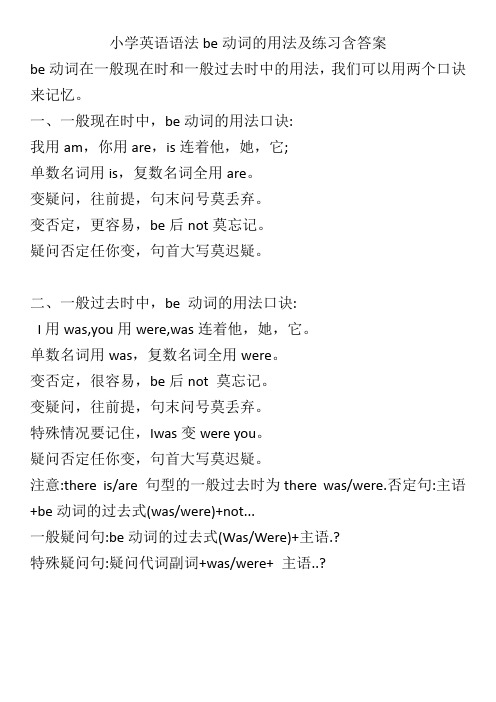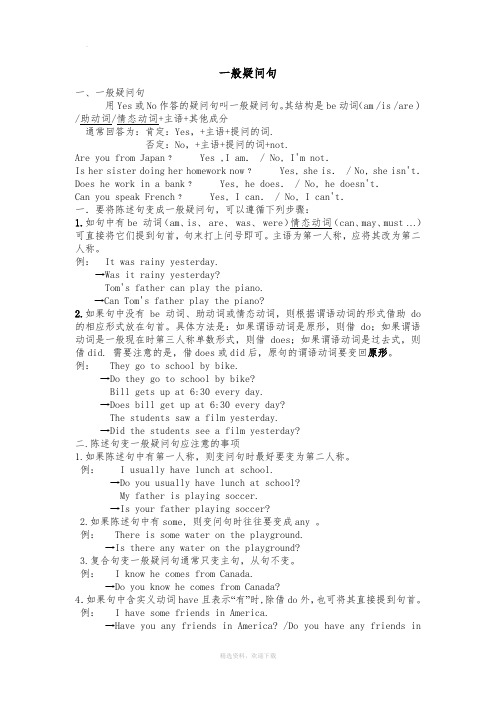小学一般疑问句和特殊疑问句和be动词一般过去时讲解与练习
小学英语语法be动词的用法及练习含答案

小学英语语法be动词的用法及练习含答案be动词在一般现在时和一般过去时中的用法,我们可以用两个口诀来记忆。
一、一般现在时中,be动词的用法口诀:我用am,你用are,is连着他,她,它;单数名词用is,复数名词全用are。
变疑问,往前提,句末问号莫丢弃。
变否定,更容易,be后not莫忘记。
疑问否定任你变,句首大写莫迟疑。
二、一般过去时中,be 动词的用法口诀:I用was,you用were,was连着他,她,它。
单数名词用was,复数名词全用were。
变否定,很容易,be后not 莫忘记。
变疑问,往前提,句末问号莫丢弃。
特殊情况要记住,Iwas变were you。
疑问否定任你变,句首大写莫迟疑。
注意:there is/are 句型的一般过去时为there was/were.否定句:主语+be动词的过去式(was/were)+not...一般疑问句:be动词的过去式(Was/Were)+主语.?特殊疑问句:疑问代词副词+was/were+ 主语..?练习用be动词适当的词填空。
1 ______a boy. I _____from Australia.2.She______a student five years ago.3. Jane and Tom_____my friends.4.Myparents_____very busy yesterday.5.I______an English teacher two years ago.6.-Where_____he from? -He ____from China.7.The light ___green just now, but it____ red now.8.My name_____Li Dong.I_____twelve.9.--____you a doctor? No, I ____not.10. ____ they your new friends? Yes.11.The girl_____Jack's sister. She___tall and thin.12.________your brother in the classroom?- Yes.13.-Where________your mother?-She______at home.14.-Whose dress___this?-It_____my red skirt.15.The books_____under the table a moment ago.16.Some tea_____ in the glass now.But there__some milk in it17.-Who_____I?-You___my dear friend.18.-_____David and Helen from England?-Yes, they_____be动词的综合练习答案1.am,am2.was3.are4.were5.was6.is,is7.was,is8.is,am9.Are,am10.Are11.is,is 12.Is 13.is,is 14. is,is 15.were 16.isn'tis17.amare18.Are.are。
一般过去时一般疑问句特殊疑问句PPT课件

北京能动时代教育科技有限公司
Key Points
一般过去时
看看下面的句子有什么不同?
一般现在时的句子
They walk downstairs. 他们走下楼
They walked downstairs. 他们走下了楼
一般过去时的句子
使用一般过去时,就是让
Key Points
一般疑问句
用yes或者no来回答的问句是一般疑问句 Was that right? Were you happier today? Did you remember me? Did you want to go to the moon, too? Did you see him yesterday?
和
按主人要求变形
Key Points
具体动词的过去式
They walked downstairs. He likeds expensive things. Jack closeds his eyes.
一般现过在去时的句子
规
则 具体动词后面加上
变
ed或d
化
不
His face wgoeenst white.
His face didn't wgeont white. 原来,具体动词过去式的否定就是 didn't+ 动词原形
Key Points
be动词的过去式
一般现过在去时的句子
I waams on his ship.
am
was
The AOL wisas breaking up. is
was
You waerere right.
英语一般疑问句和特殊疑问句的讲解及练习

一般疑问句用Yes或No作答的疑问句叫一般疑问句。
其结构是be动词(am /is/are ) /助动词/情态动词+主语+其他成分通常回答为:肯定:Yes,+主语+提问的词.否定:No,+主语+提问的词+not.Are you from Japan﹖ Yes ,I am. / No, I'm not.Is her sister doing her homework now﹖ Yes, she is. / No, she isn't.Does he work in a bank﹖ Yes, he does. / No, he doesn't.Can you speak French﹖ Yes, I can. / No, I can't.一: 般疑问句还有下列特点:1、以be动词、助动词或情态动词开头;例:Is your father a teacher Does Catherine like animals Can Jenny speak French二: 如何将陈述句变成一般疑问句要将陈述句变成一般疑问句,可以遵循下列步骤:1.如句中有be 动词(am、is、 are、 was、 were)情态动词(can、may、must …)或助动词(do、does、did、 have、 had(完成时中))时,可直接将它们提到句首,句末打上问号即可。
主语为第一人称,应将其改为第二人称。
例: It was rainy yesterday.→Was it rainy yesterdayTom's father can play the piano.→Can Tom's father play the pianoI have finished my homework.→Have you finished your homework2.如果句中没有be动词、助动词或情态动词,则根据谓语动词的形式借助do的相应形式放在句首。
(完整版)英语一般疑问句和特殊疑问句的讲解及练习

一般疑问句用be动词(am /is主语+其他成分,+主语+提问的词.否定:No,+主语+提问的词+not.Are you from Japan﹖Yes ,I am./ No, I'm not.Is her sister doing her homework now﹖Yes, she is./ No, she isn't.Does he work in a bank﹖Yes, he does./ No, he doesn't.Can you speak French﹖Yes, I can./ No, I can't.一: 般疑问句还有下列特点:1、以be动词、助动词或情态动词开头;例:Is your father a teacher? Does Catherine like animals? Can Jenny speak French?二: 如何将陈述句变成一般疑问句?1.如句中有be 动词(am、is、are、was、were can、may、must …)或助动词(do、does、did、have、had(完成时中))时,可直接将它们提到句首,句末打上问号即可。
主语为第一人称,应将其改为第二人称。
例:It was rainy yesterday.→Was it rainy yesterday?Tom's father can play the piano.→Can Tom's father play the piano?I have finished my homework.→Have you finished your homework?2.如果句中没有be动词、助动词或情态动词,则根据谓语动词的形式借助do的相应形式放在句首。
具体方法是:如果谓语动词是原形,则借do;如果谓语动词是一般现在时第三人称单数形式,则借does;如果谓语动词是过去式,则借did. 需要注意的是,借does或did后,原句的谓语动词要变回原形。
一般疑问句和特殊疑问句_讲解及练习 (2)

一般疑问句一、一般疑问句其结构是be动词(am /is /are )主语+其他成分Yes,+主语+提问的词.否定:No,+主语+提问的词+not.Are you from Japan﹖Yes ,I am. / No, I'm not.Is her sister doing her homework now﹖Yes, she is. / No, she isn't.Does he work in a bank﹖Yes, he does. / No, he doesn't.Can you speak French﹖Yes, I can. / No, I can't.1.如句中有be 动词(am、is、 are、 was、 were can、may、must …)可直接将它们提到句首,句末打上问号即可。
应将其改为第二人称。
例: It was rainy yesterday.→Was it rainy yesterday?Tom's father can play the piano.→Can Tom's father play the piano?2.如果句中没有be动词、助动词或情态动词,则根据谓语动词的形式借助do 的相应形式放在句首。
具体方法是:如果谓语动词是原形,则借do;如果谓语动词是一般现在时第三人称单数形式,则借does;如果谓语动词是过去式,则借did. 需要注意的是,借does或did后,原句的谓语动词要变回原形。
例: They go to school by bike.→Do they go to school by bike?Bill gets up at 6:30 every day.→Does bill get up at 6:30 every day?The students saw a film yesterday.→Did the students see a film yesterday?二.陈述句变一般疑问句应注意的事项1.如果陈述句中有第一人称,则变问句时最好要变为第二人称。
小学一般疑问句和特殊疑问句和Be动词一般过去时讲解及练习教学文案

一般疑问句用yes或no回答的疑问句,称为一般疑问句,这种疑问句句末语调多用升调,句末用问号“?”句型:Be动词+ 主语+ ......?●A: Am I wrong again? (我又错了?)B: Yes, you are (wrong again). (是的,你又错了。
B: No, you aren’t. (不,你没错。
)●A: Is it your bicycle? (这辆自行车是你的吗?)B: Yes, it is. (是的,是我的。
)B: No, it isn’t. (不,那不是我的。
)●A: Are you a student? (你是学生吗?)B:Yes, I am. (是的,我是。
)B: No, I’m not. / No, I am not. (不,我不是。
)●A: Is there any drinks in the fridge?B: Yes, there is. (是的,有。
)B: No, there isn’t. (不,没有。
)●A: Are there any birds in the sky? (天空中有鸟吗?)B: Yes, there are. (是的,有。
)B: No, there aren’t. (不,没有。
)陈述句中有情态动词时,可以直接将它们提前到主语前,构成一般疑问句。
句型:情态动词+ 主语+ 动词原形+ ......?●A: Can you bring me some cakes? (你能给我拿些蛋糕来吗?)B: Yes, I can. (是的,可以。
)B: No, I can’t. / No, I cannot. (不,不可以。
)●A: Must I do it now? (我必须现在做吗?)B: Yes, you must. (是的,你必须。
)B: No, you needn’t. (不,你不必。
)(1)情态动词表示请求Can/Could you carry the heavy box for me? (你能帮我提一下这个重箱子吗?)Will/Would you please give me some butter? (你能给我一些黄油吗?)May I have some rice? (我可以吃一些米饭吗?)(2)情态动词表示邀请、建议Will you visit the museum next week? (你下周来参观博物馆好吗?)Would you like to go shopping with us? (你愿意和我们一起逛街购物吗?)Shall we go swimming? (我们一起去游泳好吗?)陈述句中只有行为动词时,一般疑问句要在句首加助动词do / does / did(过去式)句型:Do/Does/Did + 主语+ 动词原形+ ......?●A: Does he have supper at home every day?(他每天都在家吃晚饭吗?)B: Yes, he does. (是的,他是。
人教PEP六年级下册英语一般过去式讲解与综合练习

一般过去时(一)基础夯实:一般过去时1.一般过去时表示过去某个时间发生的动作或存在的状态,常和表示过去的时间状语连用。
一般过去时也表示过去经常或反复发生的动作感谢。
2.Be动词在一般过去时中的变化:⑴am 和is在一般过去时中变为was。
(was not=wasn’t)⑵are在一般过去时中变为were。
(were not=weren’t)⑶带有was或were的句子,其否定、疑问的变化和is, am, are一样,即否定句在was或were后加not,一般疑问句把was或were调到句首。
3.句中没有be动词的一般过去时的句子否定句:didn’t +动词原形,如:Jim didn’t go home yesterday.一般疑问句:在句首加did,句子中的动词过去式变回原形。
如:Did Jim go home yesterday?特殊疑问句:⑴疑问词+did+主语+动词原形?如: What did Jim do yesterday?⑵疑问词当主语时:疑问词+动词过去式?如:Who went to home yesterday?基础夯实:动词的过去式请熟记以下不规则动词的过去式:am/is—was are—were do—did go—wentcome—came swim—swam run—ran sing—sangdrink—drank give—gave begin—began win—wonhave—had get—got eat—ate sit--satfeel—felt sleep—slept sweep—swept leave—leftsee—saw draw—drew fly—flew blow—blewknow—knew throw—threw tell—told take—tookmake—made say—said ride—rode write—wroteput— put set—set hurt—hurt read—readbuy—bought teach—taught think—thought catch—caughtfight—fought bring—brought一般过去时的肯定陈述句一般过去时表示过去某个时间发生的动作或存在的状态,常用的时间状语有:yesterday , just now , last +时间, … ago , in 1980等。
重点小学一般疑问句和特殊疑问句和Be动词一般过去时讲解及练习测试讲解学习

重点小学一般疑问句和特殊疑问句和Be 动词一般过去时讲解及练习测试一般疑问句用yes或no回答的疑问句,称为一般疑问句,这种疑问句句末语调多用升调,句末用问号“?”一、Be动词的一般疑问句句型:Be动词 + 主语 + ......?A: Am I wrong again? (我又错了?)B: Yes, you are (wrong again). (是的,你又错了。
(不,你没错。
)B: No, you aren’t.A: Is it your bicycle? (这辆自行车是你的吗?)B: Yes, it is. (是的,是我的。
)(不,那不是我的。
)B: No, it isn’t.A: Are you a student? (你是学生吗?)B:Yes, I am. (是的,我是。
)(不,我不是。
)B: No, I’m not. / No, I am not.A: Is there any drinks in the fridge?B: Yes, there is. (是的,有。
)(不,没有。
)B: No, there isn’t.A: Are there any birds in the sky? (天空中有鸟吗?)B: Yes, there are. (是的,有。
)(不,没有。
)B: No, there aren’t.二、情态动词的一般疑问句陈述句中有情态动词时,可以直接将它们提前到主语前,构成一般疑问句。
句型:情态动词 + 主语 + 动词原形 + ......?A: Can you bring me some cakes? (你能给我拿些蛋糕来吗?)B: Yes, I can. (是的,可以。
)B: No, I can’t. / No, I cannot. (不,不可以。
)A: Must I do it now? (我必须现在做吗?)B: Yes, you must. (是的,你必须。
)B: No, you needn’t. (不,你不必。
- 1、下载文档前请自行甄别文档内容的完整性,平台不提供额外的编辑、内容补充、找答案等附加服务。
- 2、"仅部分预览"的文档,不可在线预览部分如存在完整性等问题,可反馈申请退款(可完整预览的文档不适用该条件!)。
- 3、如文档侵犯您的权益,请联系客服反馈,我们会尽快为您处理(人工客服工作时间:9:00-18:30)。
一般疑问句用yes或no答复的疑问句,称为一般疑问句,这种疑问句句末语调多用升调,句末用问号"?〞句型:Be动词+ 主语+ ......"●A: Am I wrong again" 〔我又错了?〕B: Yes, you are 〔wrong again〕. 〔是的,你又错了。
B: No, you aren’t. 〔不,你没错。
〕●A: Is it your bicycle" 〔这辆自行车是你的吗?〕B: Yes, it is. 〔是的,是我的。
〕B: No, it isn’t. 〔不,那不是我的。
〕●A: Are you a student" 〔你是学生吗?〕B:Yes, I am. 〔是的,我是。
〕B: No, I’m not. / No, I am not. 〔不,我不是。
〕●A: Is there any drinks in the fridge"B: Yes, there is. 〔是的,有。
〕B: No, there isn’t. 〔不,没有。
〕●A: Are there any birds in the sky" 〔天空中有鸟吗?〕B: Yes, there are. 〔是的,有。
〕B: No, there aren’t. 〔不,没有。
〕陈述句中有情态动词时,可以直接将它们提前到主语前,构成一般疑问句。
句型:情态动词+ 主语+ 动词原形+ ......"●A: Can you bring me some cakes" 〔你能给我拿些蛋糕来吗?〕B: Yes, I can. 〔是的,可以。
〕B: No, I can’t. / No, I cannot. 〔不,不可以。
〕●A: Must I do it now" 〔我必须现在做吗?〕B: Yes, you must. 〔是的,你必须。
〕B: No, you needn’t. 〔不,你不必。
〕〔1〕情态动词表示请求Can/Could you carry the heavy bo* for me" 〔你能帮我提一下这个重箱子吗?〕Will/Would you please give me some butter" 〔你能给我一些黄油吗?〕May I have some rice" 〔我可以吃一些米饭吗?〕〔2〕情态动词表示邀请、建议Will you visit the museum ne*t week" 〔你下周来参观博物馆好吗?〕Would you like to go shopping with us" 〔你愿意和我们一起逛街购物吗?〕Shall we go swimming" 〔我们一起去游泳好吗?〕陈述句中只有行为动词时,一般疑问句要在句首加助动词do / does / did(过去式)句型:Do/Does/Did + 主语+ 动词原形+ ......"●A: Does he have supper at home every day"〔他每天都在家吃晚饭吗?〕B: Yes, he does. 〔是的,他是。
〕B: No, he doesn’t.〔不,他不是。
〕●A: Do you go to school on Tuesday" 〔你星期二去上学吗?〕B: Yes, I do. 〔是的,我去。
〕B: No, I don’t. 〔不,我不去。
〕●A:Did she do morning e*ercises yesterday" 〔她昨天做早操了吗?〕B: Yes, she did. 〔是的,她做了。
〕B: No, she didn’t. 〔不,她没做。
〕课堂练习将以下句子改成一般疑问句:并做肯定答复和否认答复:1. It is a lovely dog.________________________________________Yes,___________ No,____________2. They are Lily’s cousins. ___________________________________Yes,___________ No,____________3. We are classmates. ______________________________________Yes,___________ No,____________4. I am a doctor. ________________________________________Yes,___________ No,____________5. There is a bird in the tree. ________________________________Yes,___________ No,____________6. I played computer games yesterday. _________________________Yes,___________ No,____________7. She likes swimming. __________________________________Yes,___________ No,____________特殊疑问句一、疑问代词用于特殊疑问句中,疑问代词一般都放在句首,并在句中作为*一句子成分。
答复特殊疑问句,不能用"yes / no"答复。
要问什么答什么。
疑问代词:what, who, which, whose●A: What is in the room"〔房间里有什么?〕B: There are a lot of chairs in it./A lot of chairs are in it.〔有很多椅子。
〕●A:Who is that woman" 〔那个女人是谁?〕B: She is my mother. 〔她是我的妈妈。
〕●A:Whose is this pen" / Whose pen is this" 〔这支钢笔是谁的?〕B: This pen is my sister’s. 〔这支钢笔是我姐姐的。
〕●A:Which does he want" 〔他想要哪一个?〕B: He wants the blue one. 〔他想要那个蓝色的。
〕二、疑问副词when, where, why, how1. when : 询问时间,有时可以用what time代替●A: When were you born" 〔你是什么时候出生的?〕B: I was born on June 2, 2003. 〔我是2003年6月2号出生的。
〕●A: When does she go to school" 〔她什么时候去上学?〕B: She goes to school on Monday morning. 〔她星期一早上去上学。
〕2. Where : 询问地点、场所●A: Where are you from" 〔你来自哪里?〕B: I am from China. 〔我来自中国。
〕●A: Where does he live" 〔他住在哪儿?〕B: He lives in Guangzhou. 〔他住在广州。
〕3. Why : 询问原因,只能用because来答复。
●A: Why are you late" (你为什么迟到了?)B: Because I got up late this morning. 〔因为我今天早晨起晚了。
〕4. How: 询问方法、手段、状况等●A: How do you go to school"〔你怎么去上学?〕B: I go to school by bus. 〔我坐公交车上学〕●A: How is the weather today" 〔今天天气如何?〕B: It’s sunny. 〔今天晴天。
〕●How + 形容词/副词+ ......" 用来询问年龄、身高、数量、次数、距离等。
课堂练习选择的正确单词填空1._____ is that pretty girl" She is my sister.2._____ are Jack and Tom" They are behind you.3._____ do you go to school" I go to school by car.4._____ is my mother" She is in the living room.5. ______ _______ is it" It is nine o’clock.6.does he go to work" He goes to work at seven o’clock.7.is your bag" The one over there.8.is your mother" She is 45 years old.Be 动词的一般过去时Be 动词〔am, are, is〕的一般现在时和一般过去时,请看下表:Be 动词过去时的根本句型:肯定句:主语+ was/were + ......否认句:主语+ was/were + not+......一般疑问句:Was/Were + 主语+ ......特殊疑问句:疑问词+ was/were + 主语+ ......●肯定句:主语+ was/were + ......I was busy yesterday. 〔我昨天很忙。
〕Mike was in China last year. 〔迈克去年在中国。
〕You were late for school two days ago. 〔你两天前迟到了。
〕We/They were busy yesterday. 〔我们/他们昨天很忙。
〕●否认句:主语+ was/were + not+......I was not/wasn’t busy yesterday. 〔我昨天不忙。
〕Mike was not/wasn’t in China last year. 〔迈克去年不在中国。
〕You were not / weren’t late for school two days ago. 〔你两天前没有迟到。
